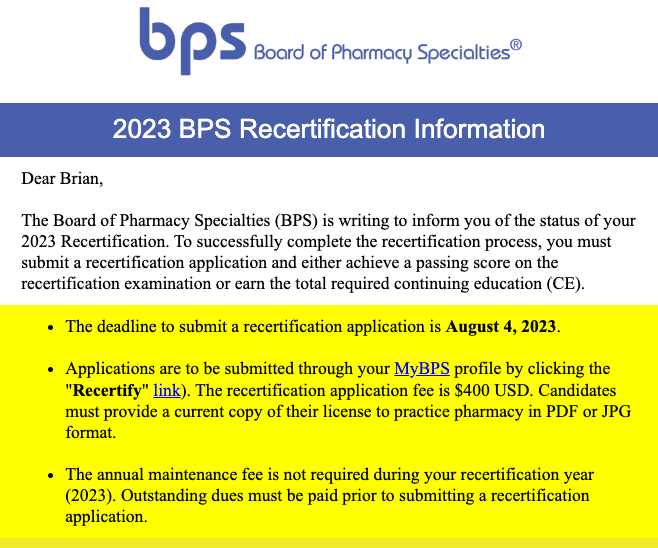I'm Letting Go of My BCPS (aka Pharmacy Board Certification)
Photo by Максим Степаненко on Unsplash
I'm letting go of my BCPS recertification this year and I have so many mixed emotions about this despite having it on the back of my mind for the last few years. I just received the recertification email from BPS - Board of Pharmacy Specialties 10 days ago and had this article on my list of tasks since it's something that I wanted to write about as I part ways with one of the biggest goals that I defined for myself ever since I started pharmacy school at the University of Florida. I'm not sure how this article will pan out as I am planning on just writing what comes top of mind as I sort through my own thoughts.
Email notification from the Board of Pharmacy Specialties
Pharmacy School Goals
I can't remember exactly when or where I heard about board certification for pharmacists, but I can tell you precisely how it made me feel the first time I heard about it: I wanted it. I wanted it because I felt as though it would make me a better pharmacist and incentivize me to keep up with the changing clinical practice guidelines. Making the best decisions for my patients was also my promise to my grandma. And so, BCPS was an absolute no-brainer for me as a pharmacy student and always made the "short-term and long-term goals" list as I progressed through pharmacy school, PGY-1, and PGY-2.
Preparing for BCPS
For individuals that decide to pursue residency training, it's quite common to take the BCPS right after PGY-1 is completed. It's also a great time to do so, especially for those who are planning on doing PGY-2s in non-clinical specialties like pharmacy informatics (aka me). However, I had opted not to as I had so much going on during PGY-2. In hindsight, it was a poor choice since I took it the next year when I started my first post-residency job and took it in the midst of an EHR go-live, studying for new Epic certifications, and juggling it with the Minnesota MPJE exam (I failed my first attempt because I overloaded myself).
I won't go into too much detail about preparing though as I created a video about it that dives deeper into how I prepared when I first took it. You can watch the full video on YouTube using this link: https://youtu.be/BDrLMCHuxU4
Informatics-Goals with BCPS
Although my original reason for getting board certified stemmed from my desire to cement my clinical knowledge, another incentive came via my experience in informatics. Anecdotally, I felt as though my credibility was sometimes questioned as I was more associated with "IT" than I was with "pharmacy". Further, given how closely I worked with clinicians in my role as an informatics pharmacist at Mayo Clinic, I also felt as though being board certified would make my recommendations on how the EHR should be designed more compelling.
As I reflect on my 7 years of having my BCPS, I definitely felt as though it has fulfilled my goals of being more knowledgeable and being acknowledged by my clinical peers.
Letting Go
So, even after all that, why let it go? Honestly, I'm still going back and forth on this even as I write this because I, no lie, shed a tear when I found out I passed. Achieving BCPS was such a huge goal of mine for the longest time and I put in a lot of effort to get it. It's akin to the feeling of studying countless hours for an exam and getting an A. Though, I didn't get an A and barely passed lol...but! It was a goal that I set my sights on and achieved (even if barely). I was proud of myself. There are probably a few reasons but the two that cemented this decision for me:
Opportunity cost. There is certainly a positive correlation between age and the value of time. With each passing year, I value my time more and more. As I embark on new goals that entail deeper knowledge of non-clinical skills (e.g. computer science and programming), I have to scrutinize where every minute of my time goes. As opposed to 30 hours of continuing education (CE) from Accreditation Council for Pharmacy Education (ACPE) every 2 years to keep my pharmacist license active, BCPS requires 120 over a 7-year period. Yes, that may not sound like a lot, but if you've ever gotten a BPS-approved CEs before, you'll know what I'm talking about. They're extremely difficult and if you don't pass the exams, you get zero credit as opposed to regular CEs that don't typically require any examination at all. At this point in my career, I'm inclined to take a step back in keeping up with every clinical practice guideline and knowing exactly which original article supports which recommendation.
Financial costs. It's expensive. Pharmacy board certifications from BPS - Board of Pharmacy Specialties last 7 years with annual maintenance fees of $125 and a $400 fee on year 7. That's $1,150 over 7 years and once you add in the initial testing fee of $600 along with any prep materials (I used AMERICAN SOCIETY OF HEALTH-SYSTEM PHARMACISTS, INC. (ASHP) which was $10/month) that easily will cost upwards of $1,800. I'm also actively licensed as a pharmacist in Florida, Utah, and Minnesota which already is a hefty cost to maintain. Letting my pharmacist license lapse is another topic of discussion, but I feel as though that's not the right decision at this time - if not ever. Also, the money saved could go towards my tuition for the current biomedical informatics and computer science courses I'm taking.
Potential Regrets
I'm unsure if I'll have any regrets about this in the future since it almost feels like I'm quitting. Especially since the process of getting my BCPS CEs would still contribute to making sure I'm up-to-date on the most recent guidelines. Though, I think this is the right decision for me, personally.
Who knows, maybe I'll sit for this grueling exam again in the future. I definitely would if I ever went back into a direct patient care role.


